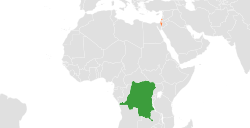During the Mobutu presidency (1965–1997)
In October 1973 following the Yom Kippur War, Mobutu decided to break diplomatic ties with Israel, declaring that "Zaire must choose between a friendly country, Israel, and a brother country, Egypt. Now, between a friend and a brother, the choice is clear". [4] Zaire would later become the first African country to re-establish relations with Tel Aviv in 1982, followed by Libéria in 1983, Côte d'Ivoire and Cameroon in 1986, and Togo in 1987. [1]
During this resumption of relations, Mobutu and Ariel Sharon, Israeli Minister of Defense in Menahem Begin's cabinet, signed a military agreement to train and equip his presidential guard. [5] Sharon also met, through Mobutu, Chadian President Hissène Habré, with whom Israel signed arms delivery contracts in 1983, in the context of the Chadian–Libyan War. [6]
Israel's aid to Zaire continued in 1994 with the signing of a $50 million contract to send around forty Israeli military advisers to Kinshasa. [5]
Modern relations
In 2012, the State of Israel opened an Honorary Consulate in Kinshasa. Aslan Piha was appointed Honorary Consul there until his death on 21 September 2023. To this day, the Honorary Consulate still handles day-to-day affairs without a head of post.
In June 2019, Joseph Kabila, Congolese president from 2001 to 2018, was accused of having recruited former Mossad agents to spy on his opponents. [7]
In March 2020, Félix Tshisekedi, Congolese president since January 2019, travelled to the United States and participated in an annual conference organized by the American Israel Public Affairs Committee (AIPAC). He announced a resumption of diplomatic relations at the highest level between his country and Israel, and the upcoming appointment of a Congolese ambassador to Israel, where the Congo had previously been represented for twenty years by a chargé d'affaires. [2]
Tshisekedi also announced the opening of a new commercial section of the DRC Embassy in West Jerusalem (while the embassy itself would remain in Tel Aviv), as well as his support for the Israeli-Palestinian peace plan proposed by US President Donald Trump This announcement provoked controversy in the DRC, as the plan was considered highly unfavourable to the Palestinians by the international community, and was rejected by the African Union, [4] which Tshisekedi became the president of in 2021. [2]
In response to the 2023 Hamas-led attack on Israel, Tshisekedi condemned the attacks of Palestinian resistance organizations against Israel. [8]


